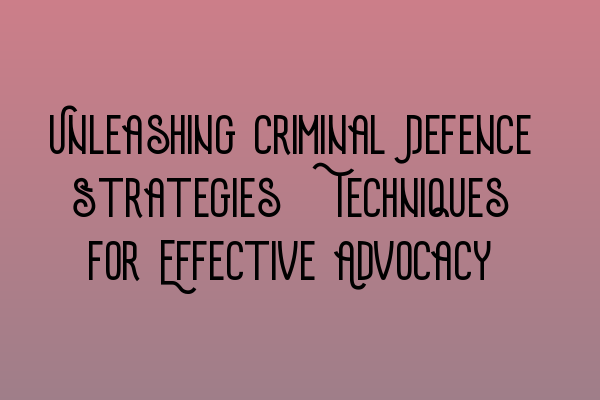Unleashing Criminal Defence Strategies: Techniques for Effective Advocacy
In the ever-evolving landscape of criminal law, it is crucial for legal professionals to stay updated and well-equipped with effective advocacy strategies. A proficient criminal defence solicitor must possess not only a deep understanding of the law but also the ability to craft compelling arguments. In this blog post, we will explore some techniques that can unleash the power of criminal defence strategies, ultimately leading to successful outcomes for clients.
1. Thorough Case Analysis
One of the fundamental steps in formulating an effective defence strategy is conducting a comprehensive analysis of the case. It is essential to delve into every aspect, from scrutinizing the evidence provided by the prosecution to identifying any mitigating factors that could potentially weaken their case. By thoroughly examining the details, a solicitor can leverage their knowledge and expertise to build a strong defence.
Related Article: SQE 1 Practice Exam Questions
2. Establishing Trust and Rapport
Developing a strong relationship with your client is paramount. By establishing trust and rapport, you can create an environment where open communication thrives. This allows you to gain an in-depth understanding of their perspective, experiences, and motivations. Building a solid connection with your client enhances your ability to craft a defence strategy that aligns with their goals and aspirations.
3. Knowledge of Procedural Rules
Being well-versed in the procedural rules of criminal law is a prerequisite for effective advocacy. By staying up-to-date with the latest legislative changes and case precedents, you can employ the most appropriate legal tactics. Understanding the nuances of the legal system enables you to exploit any weaknesses in the prosecution’s case and present a robust defence.
Related Article: SQE 1 Practice Mocks FLK1 FLK2
4. Strategic Witness Examination
The cross-examination of witnesses can often make or break a case. Mastering the art of strategic questioning is an invaluable skill for criminal defence solicitors. By meticulously preparing for witness examination, you can anticipate potential responses and effectively challenge the prosecution’s case. Craft your questions to elicit favorable testimony that bolsters your defence, while undermining the credibility of prosecution witnesses.
5. Persuasive Written Advocacy
While the courtroom is where the oral arguments unfold, persuasive written advocacy plays a significant role throughout the legal process. Skilled criminal defence solicitors have the ability to construct compelling written submissions that reinforce their client’s position. The clarity, organization, and persuasiveness of written arguments can greatly influence the outcome of a case.
Related Articles: SQE 2 Preparation Courses, SQE 1 Preparation Courses
6. Credibility in Court
Building and maintaining credibility in court is essential for effective advocacy. Maintaining a professional demeanor, respecting the court’s procedures, and displaying a command of the law instill confidence in the judge and the jury. Credibility not only enhances the persuasiveness of your arguments but also establishes you as a trustworthy representative of your client’s interests.
7. Creative Problem-Solving
Criminal defence solicitors often encounter complex and challenging scenarios. It is important to think outside the box and employ creative problem-solving techniques. By exploring alternative avenues and identifying innovative legal arguments, you can present unique defence strategies that have the potential to turn the tide of the case in your client’s favor.
Conclusion
Unleashing the power of criminal defence strategies requires a combination of legal expertise, effective communication, and meticulous preparation. By employing the techniques discussed in this article, solicitors can bolster their advocacy skills and successfully navigate the intricacies of criminal law. Remember, each case presents its own unique challenges and opportunities, and it is the responsibility of the criminal defence solicitor to craft a tailored strategy that serves the best interests of their client.
Related Article: SRA SQE Exam Dates
